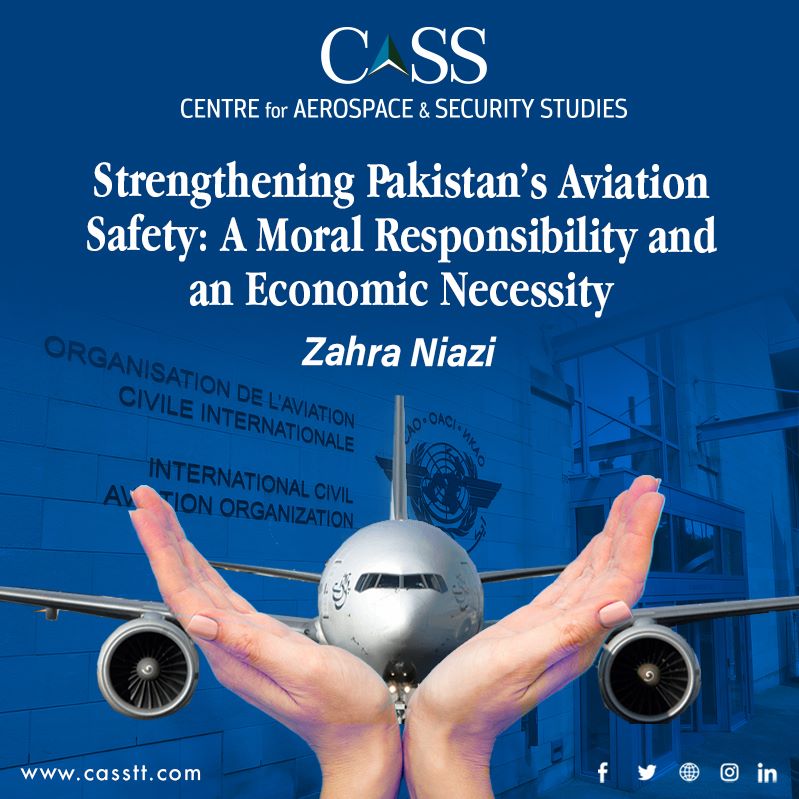‘Aviation in itself is not inherently dangerous. But to an even greater degree than the sea, it is terribly unforgiving of any carelessness, incapacity, or neglect,’
Captain A. G. Lamplugh
This precisely encapsulates the gravity of aviation safety or lack thereof.
Pakistan’s aviation safety has long been a matter of debate due to its troubled safety record, including recurring incidents of airline crashes. However, it is encouraging to note that the International Civil Aviation Organization’s (ICAO) safety audit results for Pakistan’s aviation sector based on their last mission to the country in 2021 reflect the state’s commitment to addressing aviation safety concerns. ICAO has also categorically recognised Pakistan’s efforts at addressing aviation safety concerns in recent years, especially in terms of the pilot licensing system of the state. Notwithstanding this, the audit results indicate that there are still some areas for improvement that need to be tackled through continued efforts. Resolving these concerns remains paramount not only from a moral standpoint but also from an economic point of view, as investing in aviation safety is indispensable to exploiting its economic potential.
ICAO also conducts regular aviation safety audits of member countries through its Universal Safety Oversight Audit Programme (USOAP) to ensure their safety oversight obligations are being met. The programme assesses countries’ safety oversight capabilities in eight key areas, including ‘primary aviation legislation and civil aviation regulations’; ‘civil aviation organization’; ‘personnel licensing and training’; ‘aircraft operations’; ‘airworthiness of aircraft’; ‘aircraft accident and incident investigation’; ‘air navigation services’; and ‘aerodromes and ground aids.’
USOAP’s most recent audit results for Pakistan present a mixed picture. In four areas, including ‘aircraft operations’, ‘airworthiness of aircraft’, ‘aircraft accident and incident investigation’, and ‘aerodromes and ground aids’, Pakistan managed to surpass the global average. In fact, in ‘airworthiness’, Pakistan had a significantly high score of 94.5% against a global average of 83.2%. The scores for ‘airworthiness’ are based on the country’s degree of adherence to safety standards in areas such as aircraft’s engine and propeller design, structural design and construction, or equipment design. The scores for ‘aerodromes and ground aids’ are based on factors such as ground facilities (e.g., runway safety areas) or airport maintenance; the scores for ‘accident investigation’ are determined by the state’s ability to investigate the causes of a serious incident or aircraft accident, and the parameter of ‘operations’ assesses factors such as the type of aircraft, the crew’s operating skills, or the level of sophistication of the equipment carried on the aircraft.
However, Pakistan could not meet the global average in the other four areas, including ‘legislation and regulations’, ‘civil aviation organization’, ‘licensing and training’, and ‘air navigation services.’ The parameter of ‘legislation and regulations’ assesses a country’s aviation laws, while the parameter of ‘civil aviation organization (CAO)’ assesses the effectiveness and capability of the country’s CAO system. Additionally, the scores for ‘licensing and training’ are based on factors such as the qualifications, training, or experience of the technical personnel; and the scores for ‘air navigation services’ are based on the availability of the air traffic control units or flight information centres that provide air traffic information or services.
Importantly, in legislation and regulations, Pakistan’s score of 50% was well below the global average of 76.4%; and in air navigation services, its score of 43.1% was well below the global average of 65.2%. According to the USAOP report, the general highlights of the issues identified in the legislation area include states’ lack of ability to establish comprehensive procedures to timely revise their primary aviation legislation or civil aviation regulations in accordance with the provision in the Annexes to the Chicago Convention; absence of an appropriate system for identifying and notifying the variances between the national regulations and practices and general standards and recommended practices; or issues with respect to establishing and implementing enforcement policies to ensure effective enforcement of the legislation and regulations, among others. Likewise, major concerns with respect to air navigation services included states’ inability to ensure the maintenance and periodic review of flight procedures, smooth search and rescue services, weak implementation of enforcement actions and formal surveillance programmes for air navigation service providers.
Pakistan’s aviation sector has demonstrated great economic potential. The International Air Transport Association (IATA) estimates that the country’s air transport sector, comprising the airlines and their supply chains, supports USS 2 billion of the country’s GDP, and the spending by foreign visitors supports another USD 1.3 billion, resulting in a total contribution of 1% to the country’s GDP. By addressing the identified shortcomings, this sector has the potential to become economically stronger.
To increase aviation’s economic contribution, Pakistan must continue to strengthen its aviation safety reputation by investing in all areas, including those where it has already managed to beat the global average. This can help boost the economy by expanding airlines’ customer base and tourism; prospects for securing more routes and destinations; avoiding the costs associated with accidents; and attracting investment in the country’s aviation sector. Beyond the potential economic benefits of addressing these concerns, it is essential that we recognise the immeasurable value of human life and approach this issue with the utmost care and attention. By prioritising safety in our aviation sector, we not only safeguard the lives of our citizens and visitors, but also demonstrate a commitment to our shared humanity and the highest moral ideals of progress and prosperity.
Zahra Niazi is a Research Assistant at the Centre for Aerospace & Security Studies (CASS), Islamabad, Pakistan. The article was first published in Pakistan Today. She can be reached at cass.thinkers@casstt.com.




